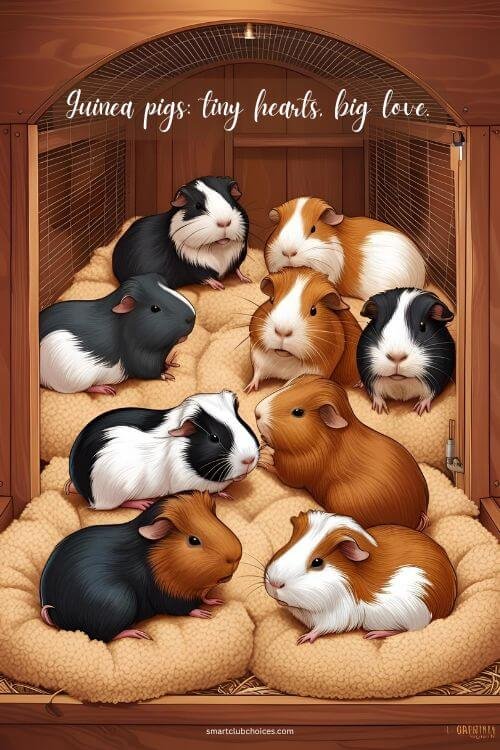Guinea Pig Care: A Complete Guide to Keeping Your Furry Friend Happy
Small Pets, Big Responsibilities
Guinea pigs are adorable, sociable, and relatively low-maintenance pets, but they still require proper care to ensure they live a long, happy, and healthy life.
Whether you’re a first-time guinea pig owner or looking to improve your current pet care routine, understanding their needs is essential.
This guide covers everything you need to know about guinea pig care, from housing and diet to socialization and health.
Table of Contents
(1) The Perfect Home: Setting Up the Ideal Guinea Pig Habitat
Guinea pigs may be small, but they need plenty of space to move around and exercise. A proper cage setup ensures their comfort and well-being.
- Cage Size: Aim for at least 7.5 square feet of space for one or two guinea pigs, though bigger is always better.
- Bedding: Use soft, absorbent bedding like fleece liners or paper-based bedding. Avoid cedar or pine shavings, as they can cause respiratory issues.
- Hideouts and Accessories: Guinea pigs love hiding places. Provide igloos, tunnels, or even cardboard boxes for them to feel secure.
- Temperature and Lighting: Keep their environment between 65–75°F (18–24°C). Avoid direct sunlight and drafts to prevent overheating or chills.
- Cleaning Routine: Spot-clean the cage daily and do a full clean once a week to maintain hygiene and prevent odors.

(2) Feeding Your Guinea Pig: A Balanced Diet for a Healthy Life
A proper diet is crucial to keeping your guinea pig healthy and active.
- Hay is Essential: Fresh hay (like timothy hay) should make up 80% of their diet. It helps with digestion and keeps their teeth in check.
- Pellets: High-quality, vitamin C-fortified guinea pig pellets provide additional nutrients but should be given in moderation.
- Fresh Vegetables: Offer a variety of fresh veggies daily, such as bell peppers, carrots, cucumbers, and leafy greens like romaine lettuce.
- Fruits as Treats: Fruits like apples, strawberries, and blueberries can be given occasionally due to their high sugar content.
- Water: Fresh, clean water should always be available in a bottle or dish.
(3) Socialization and Interaction: Keeping Your Guinea Pig Happy
Guinea pigs are social creatures and need daily interaction to thrive.
- Companionship: Guinea pigs do best in pairs or small groups. If you only have one, make sure to spend extra time with them.
- Handling with Care: Always pick up your guinea pig gently, supporting their body to make them feel safe.
- Playtime: Let them explore outside their cage in a safe, enclosed area for exercise and mental stimulation.
- Toys and Enrichment: Provide chew toys, tunnels, and cardboard boxes to keep them entertained.
(4) Health and Grooming: Ensuring a Long and Happy Life
Regular health checks and grooming help prevent common guinea pig illnesses.
- Signs of a Healthy Guinea Pig: Bright eyes, clean ears, smooth fur, and an active demeanor are good indicators of health.
- Common Health Issues: Keep an eye out for respiratory infections, dental problems, and scurvy (caused by a lack of vitamin C).
- Nail Trimming: Trim their nails every few weeks to prevent overgrowth.
- Coat Care: Short-haired guinea pigs require minimal grooming, while long-haired breeds need regular brushing to prevent matting.
- Veterinary Care: Schedule annual checkups and visit a vet if you notice changes in behavior, appetite, or physical condition.
(5) Conclusion: A Rewarding Commitment
Caring for a guinea pig is a rewarding experience that requires time, love, and dedication. By providing proper housing, a balanced diet, social interaction, and regular health checkups, you’ll ensure your guinea pig lives a happy and fulfilling life.
These little pets may be small, but their impact on your life will be anything but. Treat them well, and they’ll reward you with endless squeaks, cuddles, and joy!








